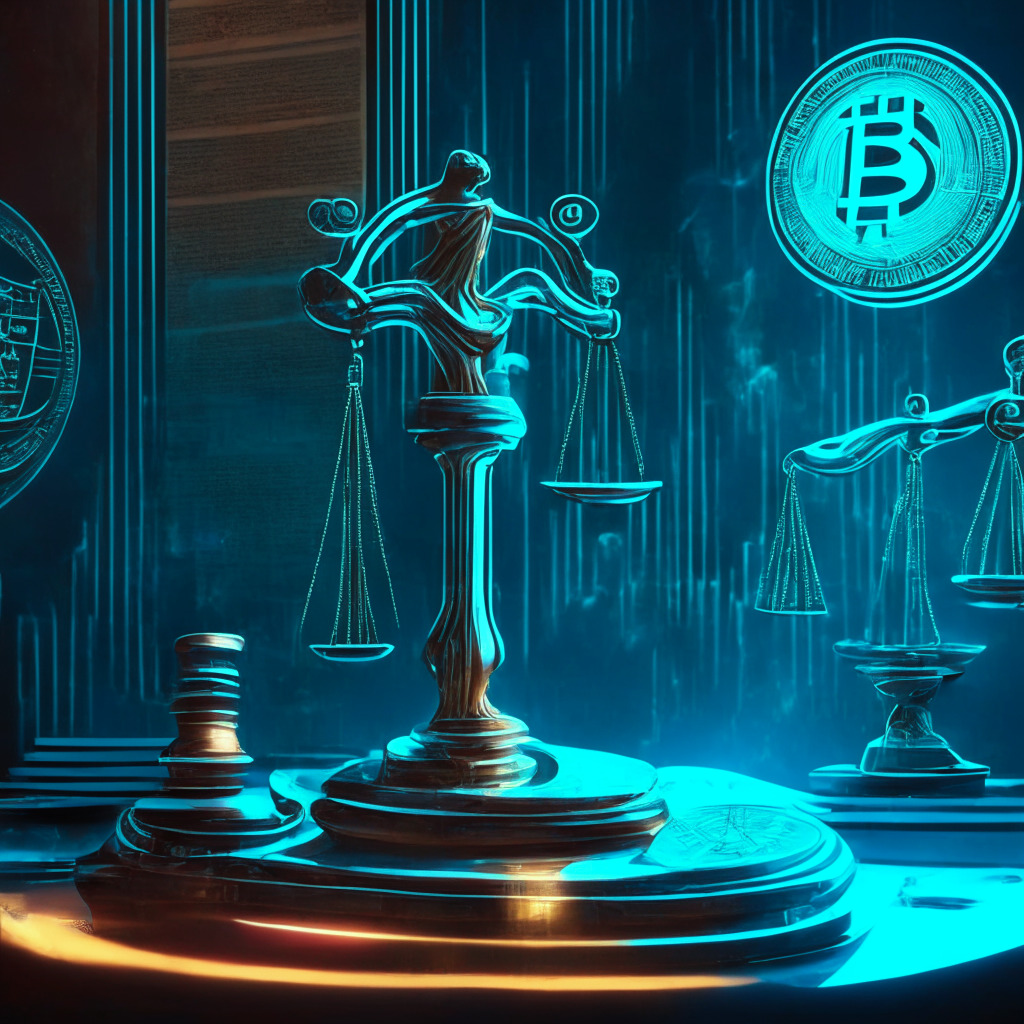Sandbox, a renowned metaverse platform, has initiated Know Your Customer (KYC) measures in line with protocol staking. Staking users must complete a verification process, a move intended to improve security and compliance. Animoca Brands expressed optimism about Hong Kong’s changing blockchain attitudes amidst ongoing SEC allegations.
Search Results for: US Security and Exchange Commission
Evaluating Cryptocurrency Growth: Past Performance & Future Prospects in a Volatile Landscape
The cryptocurrency circle has seen significant changes since 2017, with Bitcoin hitting a remarkable peak. Top cryptocurrencies have shown remarkable resiliency and growth, sparking interest from investors. However, volatility and legal issues also punctuate the market, prompting the need for investor caution.
Ripple vs SEC: The Unfolding Drama and Its Implications on Crypto Regulation
“The Ripple case underlines the complexity of cryptocurrency regulations and the uncertainties prevalent due to its rapidly evolving landscape. This regulatory maze demands transparent regulations, fair oversight, and a consensus. The industry craves clear guidelines; until then, instances like Ripple’s will continue illuminating the nuances of cryptocurrency regulations, fostering legislative paths.”
SEC vs Terraform Labs – The Future Clash of Regulatory Oversight and Blockchain Freedom
U.S District Judge Jed Rakoff dismissed Terraform Labs’ plea to drop a securities fraud lawsuit by the SEC. Rakoff argued that the company’s TerraUSD stablecoin could be deemed a security, given its value fluctuations. The ruling presses on the unresolved tension between crypto industry and regulatory bodies.
Navigating the Risks and Rewards of Meme Coins Amidst Crypto Market Turbulence
Cryptocurrency world is undergoing some unease due to recent security breaches and lawsuits. Despite the risk, investors remain attracted to meme coins for short-term profits. However, these coins lack substantial utility, making their long-term value questionable. Caution and discretion are advised in this high stake investment realm.
Navigating Uncertainty: Bitcoin’s Tumultuous Journey and the Pivotal Role of Upcoming US Data
“Bitcoin’s near-term course might significantly be influenced by its stand at the pivotal support zone in the mid-$28,000s. If the currency demonstrates resilience, it could indicate an upcoming test of yearly highs. Bitcoin’s response to this challenge could illuminate the cryptocurrency markets this August.”
Navigating the Swiftly Changing Cryptographic Asset and Blockchain Landscape: Successes, Setbacks, and Security Issues
“The cryptographic asset and blockchain industry continually evolves. Recent developments include banking issues for Hong Kong crypto businesses, digital criminality, varied progress for Binance in Dubai and Nigeria, operational updates at Kraken, central bank digital currency tests in Korea, and a new partnership for Sorare. These highlight the rapid advancement and regulatory challenges in blockchain technology.”
Navigating the Maze: The Trials and Triumphs of Establishing Hong Kong as a Crypto Hub
“Hong Kong is working towards becoming a crypto hub, but faces challenges such as difficulties for crypto companies in opening corporate bank accounts. Despite the slow pace of local regulatory organizations, efforts are being made to ease these obstacles with initiatives like Hong Kong Monetary Authority urging significant lenders to accept crypto exchanges as clients.”
Navigating the Future of Freelancing with DeeLance: Blockchain Integration and NFT Tokenization
“DeeLance, a blockchain-based freelance platform, offers transparency, security, and new NFT applications for tokenizing work products. Its decentralized nature combats issues like excessive commission fees, unclear deals, and entry barriers, fostering a healthier and fairer ecosystem for freelancing.”
Unraveling SEC’s Cybersecurity Disclosures: Balancing Investor Trust and Corporate Burden
The Securities and Exchange Commission (SEC) has directed all listed entities, including cryptocurrency enterprises, to annually disclose their “cybersecurity risk, management strategy, and governance.” Firms need to report major cybersecurity incidents within four days, elaborating on the attack’s nature and timing. The new regulation is introduced to fortify investor trust and encourage companies to adopt stringent cybersecurity measures.
Dark Side of Crypto: Rising Casualties and Increasing Regulations, Unveiled
“The mysterious demise of Argentina-based BTC millionaire Fernando Pérez Algaba has caused speculation within the crypto community. U.S. regulations are tightening on cybersecurity for crypto businesses, with the SEC mandating listed firms to disclose major cybersecurity incidents within four days.”
Striking a Balance: Implications of New SEC Cybersecurity Disclosure Regulations on Crypto Firms
“The SEC has ruled that significant public firms, such as cryptocurrency companies Coinbase, Marathon Digital, and Riot Blockchain, must disclose major cybersecurity breaches within four days. This rule signifies an intensified blend of finance, tech, and cybersecurity in our digital age, though concerns have been raised about feasibility and potential operational burdens.”
Biometric Verification for Crypto: Worldcoin’s Strategy Stirs Mixed Reactions and Global Debate
Worldcoin co-founder Sam Altman recently celebrated mass adoption of the currency, noting people in Japan trading iris scans for Worldcoin tokens using the Worldcoin Orb. Despite this, reactions are mixed, with concerns about privacy, data safety, and uneven global response to Worldcoin’s adoption strategy. The future of crypto-identity verification and global blockchain adoption remains a topic of debate.
Surge in Trading Volumes and Open Interest: The Rise of CME’s Bitcoin and Ether Futures
“Second quarter records for Bitcoin and Ether futures have been broken by the Chicago Mercantile Exchange, signifying rising institutional interest in these assets. Despite market instability, regulated avenues simplify risk management, while CME’s cash-settled futures free institutions from owning crypto outright and enhance hedging tools’ appeal.”
The Reality Check: Quantstamp Penalization and the Regulation Challenge in Blockchain
Quantstamp, a blockchain security firm, faced a $28 million SEC penalty for conducting an unregistered ICO for QSP tokens in 2017. Incurring additional fines for trading these tokens on third-party platforms, Quantstamp had to establish a “Fair Fund” to reimburse investors, potentially leading to permanent disablement or destruction of QSP tokens. This incident underscores the tension between deregulation and regulatory compliance in blockchain technology.
Unraveling the Tennessee Crypto Scam: Investor Security, Regulations and the Price of Greed
A couple, Michael and Amanda Griffis, were found to have deceived more than 100 individuals in a fraudulent crypto investment scheme, amassing over $6 million. They failed to register their scheme with the CFTC, leading to legal issues and the loss of funds for their investors. This incident highlights the necessity for regulatory scrutiny and investor education in the high-stakes crypto market.
Navigating the Crypto Landscape Amid Regulatory Tumult: A Case for Proactivity and Diligence
“Amidst regulatory uncertainty, the cryptocurrency sphere calls for a more pragmatic approach grounded in know-how and thoughtful consideration. Adopting a traditional finance framework for cryptocurrencies, a focus on due diligence initiatives, and regulatory technology (regtech) are crucial. Prioritizing fraud prevention is non-negotiable for trust and credibility in the expanding crypto ecosystem.”
Bundle’s Strategic Pivot: Swapping Crypto Exchange for P2P Dominance in Nigeria
Bundle, the renowned social payments platform, has decided to discontinue its crypto exchange service to focus on its successful peer-to-peer platform, Cashlink. Despite Nigeria’s tough stance on digital currency transactions, the country remains a hotspot for crypto activities, particularly through peer-to-peer platforms.
Ripple’s Bid for Crypto License in UK & Ireland: A Strategic Move or a Cause for Concern?
Ripple, the blockchain-based digital payment network, has applied for a crypto asset firm registration in the UK and a payment institution license in Ireland following its partial legal victory against the US Securities and Exchange Commission. Despite skepticism about the clarity of the ruling, Ripple continues growing in Europe.
Regulatory Uncertainty, DeFi Accountability, and Cryptocurrency-backed Dollar: A Crypto Crossroads
Regulation discussions remain a pressing issue in the cryptocurrency space. With the SEC undecided on Ripple’s ruling, a newly-introduced U.S Senate bill targeting decentralized finance (DeFi), and proposals of Bitcoin being utilized to strengthen the U.S dollar, the future of cryptocurrency is fascinatingly unpredictable.
Assessing the Impact of Newly Proposed US Blockchain Regulation Bill
Senior House Republicans proposed a bill called the “Financial Innovation and Technology for the 21st Century Act.” The legislation aims to define “blockchain” and “digital asset” in financial laws, clarify the roles of the CFTC and SEC in cryptocurrency oversight, and establish clear guidelines for classifying digital assets. Despite some opposition, it has substantial backing due to its dual objective of consumer protection and promoting innovation.
Indonesia’s National Crypto Exchange: A Pioneer Move Towards Regulated Trading or Restriction to Global Trends?
Indonesia has launched its national cryptocurrency exchange and clearing house, overseen by the Commodity Futures Trading Supervisory Agency (CFTRA). The exchange is Indonesia’s exclusive legal zone for digital asset trading. Strategic decisions by the CFTRA and Indonesia’s Ministry of Trade have shaped the country’s digital currency platform, emphasizing domestic participation and the need for international and national regulations that safeguard consumer interests.
Navigating the Pros and Cons of the U.S. House Republicans’ New Crypto Oversight Bill
“The Financial Innovation and Technology for the 21st Century Act by U.S. House Republicans aims to provide a sound regulatory framework for crypto investors protection. The bill seeks to establish clear regulatory principles balancing progressive tech with protective legislation, which, if successful, may streamline the fragmented regulation landscape in the U.S. and serve as a global blueprint.”
An Unexpected Twist: XRP and XLM Outperform Bitcoin and Ether Amid Legal Uncertainties
“Despite regulatory uncertainties, altcoins XRP and XLM outperformed Bitcoin and Ether, rising by 6.8% and 18% respectively. This unexpected surge reflects the oscillatory nature of crypto markets and reveals increasing interest in altcoins. However, legal ambiguities surrounding crypto status could pose both opportunities and challenges for crypto organizations.”
US Congress Critics Challenge SEC’s Approach to Crypto Regulation
“US representatives French Hill and Dusty Johnson question SEC chairman Gary Gensler’s approach to digital asset regulation. They suggest that shaping legislation is a more potent tool for resolving regulatory issues in the digital asset space, offering firms guidance and bolstering customer protection.”
Crypto Pioneer Treads Volatile Waters: The Journey of KIN and the Birth of Code Wallet
The minimalist crypto wallet Code, backed by the former CEO of Kik, has launched its Solana-based application focusing on the KIN cryptocurrency. Despite regulatory challenges, Code’s founder believes it offers potential for adoption due to its clearance for U.S trading. Confidently advocating for ‘digital paper cash’, it also allows transactions during network outages. However, its success relies heavily on KIN’s acceptance as a legitimate payment method, a venture that comes with risks due to price volatility.
Hotbed of Innovation vs Regulatory Compliance: The Showdown at Australia’s FTX
“The ASIC’s cancellation of FTX’s financial license reveals careful regulation balancing innovation and risk in the crypto landscape. Despite FTX’s mismanagement issues, regulators recognize a need for continuity and service to existing clients, emphasizing blockchain technology’s potential.”
Riding the Red Wave: Cryptocurrency Volatility and the Potential Dynamism of Altcoins
“Cryptocurrency prices show a sea of red; Bitcoin near $30,000, Ethereum at $1,896. However, coins like Ripple, Stellar, Solana, and Optimism show significant growth. As Ripple’s court victory concluded XRP is not a security, Coinbase’s stock benefited. Despite overall market volatility, these intriguing developments provide insight into the interconnected crypto ecosystem.”
Coinbase CEO Meets US Lawmakers: Future of Cryptocurrency Legislation
The upcoming meeting between Coinbase CEO and US lawmakers could greatly influence cryptocurrency legislation. Topics include impacts of crypto technology on security, privacy, and climate, as well as crypto legislation. This meeting arrives amidst legal disputes and mixed opinions on potential regulations possibly hindering innovation and transaction privacy.
Uncovering the Crypto Saga: Coinbase CEO Meets House Democrats on Regulations
“Brian Armstrong, CEO of Coinbase, is set to meet with House Democrats to discuss cryptocurrency regulations, focusing on taxation, security, privacy, and climate. Coinbase’s recent challenges with the SEC underscore the need for clearer cryptocurrency regulations.”
Navigating the Regulatory Minefield: Coinbase CEO’s Impending Meeting with House Democrats
Brian Armstrong, CEO of Coinbase, is expected to meet with U.S. House Democrats to discuss digital-asset legislation covering tax, national security, privacy, and the environment. The complex interplay of commerce, technology, and regulatory policy is generating discourse on crypto regulation.
Ripple Ruling: A Glimmer of Hope or Mere Mirage for Crypto Exchanges?
Cathie Wood of Ark Invest remains optimistic about Coinbase and the crypto community after Ripple’s partial win over the SEC. However, regulatory outlook for crypto exchanges remains uncertain, suggesting potential challenges and a complex, exciting future.































